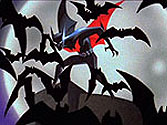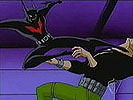 |
 Eyewitness
Eyewitness
When
Gordon sees Batman kill a criminal, she vows to hunt him down.
Original Airdate: January
22, 2000
Episode # 27
Rating: * 1/2
|
||
|
|
|
| Credits | Cast | |
Story by Rich Fogel Teleplay by Hilary J. Bader Directed by Butch Lukic Music by Lolita Ritmanis Animation by Koko/Dong Yang |
Will Friedle as Terry McGinnis Kevin Conroy as Bruce Wayne Stockard Channing as Commissioner Gordon Henry Rollins as Mad Stan |
Jon Cypher as Spellbinder Gregg Berger as Pilot John Mariano as Driver Joe Spano as Boss |
|
|
 Fictive
art may be defined as a conspiracy between artist and audience, their secret
agreement to create in the world a new reality. And "create" is
not to strong a word; if enough people keep moving George Kaplan’s
things around, the world begins to look a place inhabited by a man named
"George Kaplan." So too for Ulysses and Aladdin and Hamlet; for
Don Quixote, Victor Frankenstein, and the Red King; and for Charles Foster
Kane and the Real Inspector Hound. Fictive
art may be defined as a conspiracy between artist and audience, their secret
agreement to create in the world a new reality. And "create" is
not to strong a word; if enough people keep moving George Kaplan’s
things around, the world begins to look a place inhabited by a man named
"George Kaplan." So too for Ulysses and Aladdin and Hamlet; for
Don Quixote, Victor Frankenstein, and the Red King; and for Charles Foster
Kane and the Real Inspector Hound.
Cooperation is the touchstone of the enterprise. The audience is witness to the artist’s activity, the justifier and redeemer of his prevarications. Likewise, the artist’s conscious agency gives the audience (in its state of expectant enchantment) an object to observe. So the audience must approach a work of fiction in a spirit of good faith, and the writer must earn and maintain this spirit of indulgence. Deception (lying to the audience) and self-delusion (the belief that something exists that actually doesn't) are the evils that result when one or other fails of his duty. Batman Beyond began with a promise, to show us the career and development of Bruce Wayne’s successor as Dark Knight, to convince us that it was possible to pass on the mantle. Only the most hard-hearted or incurious could resist the lure. Would it work? The series is history now, its 52-episode network commitment completed. Judgment is possible. On the whole the series was a success, giving us key developments and insights into characters new and old: "Babel," "Big Time ," "Lost Soul," "Meltdown," "Out of the Past," "Rebirth," "A Touch of Curare," and Return of the Joker most prominently. And yet it must be said that the process was very fitful and finally incomplete. Terry McGinnis came equipped with a life and accumulated a Rogue’s Gallery. Yet we discovered a great deal more about the latter than the former. And this was a great flaw, for Batman is not born but created, and if we are to finally believe and accept Terry as the new Bat we must actually witness his development. "Lost Soul" may have peeled back the suit and showed us that Batman is a person and not a costume, but the series seemed to avoid going deeper and peeling back the person. Usually it rested content with giving us action sequences. "Eyewitness" perfectly exemplifies this persistent weakness. The basic problem here is that no one is really forced to make any hard choices which would either propel the story or reveal something about a character. For instance: The most important thing about Batman is that he does not kill. Given the monsters Bruce faced and defeated, the temptation put an end to the Joker, or Scarecrow, or Poison Ivy must always have been there. So how does one come to this moral decision and form the hardness to cling to it? We may accept that Bruce has successfully done so, just as we accept so much about Bruce. But we need to see Terry struggle to master it—otherwise there is not the same sense that it is now in his character as it was in Bruce’s. Instead, "Eyewitness" rests content with a shallow assertion. Would he kill? He says he wouldn't, but that attitude apparently is a given, something he donned along with the Batsuit or decided upon somewhere else outside our range of vision. So evaporates the great opportunity to see him struggle to this resolution. So too is Barbara Gordon cheated of development. Here she expresses a willingness to reveal her own past (and that of Wayne) if that's what it takes to bring McGinnis to justice, but the story comes nowhere near to forcing her to drink from that bitter cup. Nor is she revealed as anything but a conscientious enforcement officer (something we knew already). Had something of an obsession or vendetta against Terry been revealed in her the story might have had some drama, but she's one of the good guys, and so that's not going to happen. Even at the level of specious story-telling the episode fails by trying to cheat the viewer; like a sharpie at three-card monte it tries to prove that the writer’s hand is quicker than the viewer’s eye. Barbara Gordon sees Batman killing Mad Stan; more relevant still, we see it too. So who are we (and Gordon) gonna believe, McGinnis or our own lying eyes? But not for an instant do we doubt Terry, and it's all too easy to guess the solution to the conundrum. But Gordon doesn't make the guess because then there wouldn't be a story. And, anyway, what story there is reduces pretty much to a series of chases and fights. The result is entirely forgettable, save as a cautionary lesson. Instead of putting its characters under a microscope, it gives us the story of a misunderstanding that simply doesn’t go anywhere. One gets the feeling that not only are Terry and Barbara willing to forgive and forget it ever happened, they and everyone else have forgotten it before the end credits even roll. |
|
|
|
|
Related
Episodes |
What
Others Are Saying ... |
|
|
| Back
to Epilogue |
Forward
to
Final Cut |